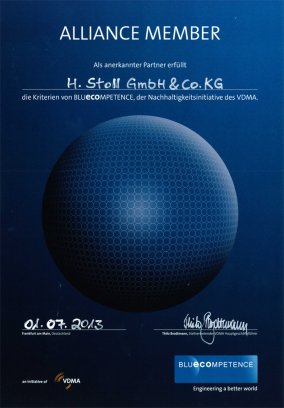
Online training - learn safely from home with Stoll
Since June of this year, long-term VDMA (German Engineering Federation) member H. Stoll GmbH & Co. KG has been an active partner of the ‘Blue Competence’ Sustainability Initiative launched by the organisation.

7th October 2013
Knitting Industry
|
Reutlingen
Since June of this year, long-term VDMA (German Engineering Federation) member H. Stoll GmbH & Co. KG has been an active partner of the ‘Blue Competence’ Sustainability Initiative launched by the organisation.
The goal of the VDMA Blue Competence Sustainability Initiative is to address the issue of resource conservation. The initiative therefore supports companies in improving energy efficiency, localizing and consciously using energy sources, consuming raw materials correctly and sparingly while also reducing emissions.
At the company level, resource conservation can affect its entire life cycle, including production and non-production areas. The initiative also deals with future mobility, waste and closed loop recycling management, life cycle costs and the general question concerning quality of life in the company.
Even before partnering with the initiative Stoll says it had already been working on implementing sustainability measures as part of its drive to effectively conserve resources throughout the company and it has already successfully developed new technologies and solutions that have brought it closer to achieving this goal.
“Asynchronous motors are generally used in the fabric take-down in knitting machines. Depending on the design, they tend to have low efficiency which leads to high power losses. An asynchronous motor used for fabric take-down at a lower speed results in a major power loss at a higher torque. The unwanted heat generated in this process is wasted energy that has to go somewhere,” Stoll says in relation to fabric takedown systems.
“Another disadvantage of this motor is that its high temperatures reduce the service life of the bearings and motor. A more energy-efficient motor technology was needed to reduce the power loss. That's why Stoll came up with a new type of servo motor that uses a servo amplifier, which helps the fabric take-down use 20% less energy.”
The company says this not only helps the environment and extends the service life of the electrical components but it also saves customers money.
Many machine manufacturing production areas require a great deal of power to keep the large number of machines in operation. According to Stoll, more efficient and better lighting in the production hall may at first seem like a minor cost saving measure, but with a large number of machines, it is not inconsiderable and offers enormous savings potential for the long term.
“Traditionally, manufacturers use fluorescent tube lighting in their production halls, which has average light emitting efficiency and a low service life. Fluorescent lights are usually always switched on even when they aren't needed. To make the production hall more energy efficient and the machine operators more environmentally aware, energy-saving lights with a controlled switch-on time were installed. This is not feasible with traditional fluorescent tubes because turning them on and off frequently reduces their service life,” Stoll explains.
These measures are just a few examples of how the company has demonstrated its commitment to Blue Competence. Because sustainability is so important at the economic, political and social levels, it has become an inherent factor in how the company as a whole is managed.
“Awareness in the textile machine manufacturing industry is shifting toward higher resource conservation and efficiency improvement. Also corporate social responsibility as a company value has become more critical than ever,” Stoll adds.
Stoll says it is confronting these challenges and believes that its most urgent task is to find a harmonious balance between humans and nature. In addition to environmental protection, the company intends for these measures to improve the quality of life of its employees and enable them to work more efficiently. These goals will be gradually implemented with the help of newly developed technologies.
“Now that it has partnered with Blue Competence, Stoll is working harder on this issue more than ever,” the German company concludes.
Stoll claims the following benefits for its sustainability measures:
H. Stoll GmbH & Co. KG is a leading producer worldwide of flat knitting machines with headquarters in Reutlingen, Germany. The traditional company was founded in 1873 and has 1000 employees worldwide. The Stoll brand name portfolio includes flat knitting machines and pattern software used to manufacture fashion, industrial and medical textiles. Its products have been successfully sold in over 70 countries.
With subsidiaries, sales and service centres as well as numerous distributors all over the globe, Stoll offers a complete and integrated service program. Through innovative technological developments that concentrate production on the ‘made in Germany’ reputation, Stoll is at the forefront of many knitting and textile trends, which it introduces using internally developed inspiring collections.

Business intelligence for the fibre, textiles and apparel industries: technologies, innovations, markets, investments, trade policy, sourcing, strategy...
Find out more